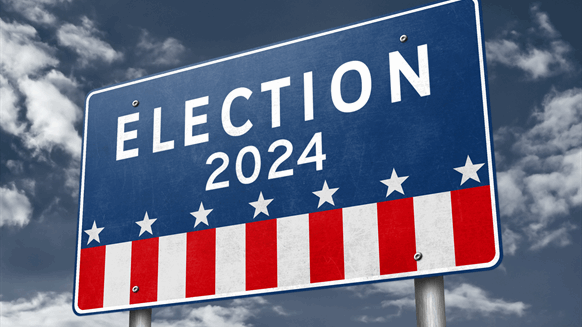Oil and gas investors shouldn’t sweat the polls, Morningstar stated in a new report sent to Rigzone.
“During the last nine presidential terms, there is no relationship between energy returns and what political party controls the White House or Congress,” Morningstar said in the report, adding, “we do not expect that to change in 2024”.
The company noted in the report that “valuation remains a much more prescient indicator of energy returns given the influence of events exogenous to the U.S. political system”. It added in the publication however, that “the current valuation of the energy index of 0.92 price/fair value does not offer a clear buy or sell signal like it has in the past”.
Morningstar highlighted in the report that, preceding Trump’s election, the price/fair value stood at 1.3, which it pointed out was “very overvalued, leading to the subsequent 41 percent decline in the index and 87 percent relative underperformance”.
“No, we couldn’t have foreseen the pandemic, but we wouldn’t have recommended shares regardless,” the company said in the report.
“Prior to Biden’s election and energy’s subsequent 189 percent return and 136 percent relative outperformance, the index stood at price/fair value of 0.53, a clear buy,” Morningstar added.
“Investors who ignored any common perceptions about which presidential candidate would be best for energy stocks and just bought on valuation were rewarded,” it continued.
USA Production
In the report, Morningstar noted that, outside of equity performance, investors also try to infer an outlook for U.S. production growth from the outcome of the presidential election. The company said this is also largely a waste of time.
“The fact is, since exploration and production companies began exploiting U.S. unconventional resources in the late 2000s, the only thing that has stopped U.S. oil and gas production was low prices and even that proved temporary,” it noted.
“We expect no change come November. Instead of the president or his political party, improving efficiency at unlocking unconventional resource and abundant capital drove U.S. energy production growth higher during the last 15 years,” it added.
“Granted, a lot of capital was destroyed during that time as well, but that had little to do with the president,” it continued.
Morningstar stated in the report that the slowing rate of growth during the Biden administration is more a result of management teams adopting greater capital discipline than administration policies.
“Rystad expects growth for both oil and gas into the next decade before plateauing, and we do not expect that forecast to change materially after election day,” Morningstar added in the report.
According to data on the U.S. Energy Information Administration (EIA) website, which shows yearly U.S. field production of crude oil from the 1850s to 2023 and was last updated on September 30, U.S. field production of crude oil averaged 12.935 million barrels per day in 2023.
Data on the EIA website showing monthly U.S. field production of crude oil from January 1920 to July 2024, which was also last updated on September 30, showed that U.S. field production of crude oil averaged 13.205 million barrels per day in July.
In its latest short term energy outlook, the EIA projects that U.S. crude oil production will average 13.22 million barrels per day in 2024 and 13.54 million barrels per day in 2025.
Different Policies
In its report, Morningstar said it doesn’t suggest oil and gas companies, or their investors, can expect the same policies in a Trump or Harris presidency.
“They shouldn’t,” it added.
“However, our larger point is that the drivers of energy equity performance are much larger than who sits in the White House and those drivers are inherently unpredictable,” it continued.
“Unless, of course, one thinks war in the Middle East and skyrocketing oil prices are more or less likely with the election of one candidate over another,” it went on to state.
The company noted in the report that ultimately, it thinks the more critical factor for energy equities is that investors continue to demand capital discipline from these firms.
“In other words, given the investor-enforced discipline, we do not see firms meaningfully changing their investment plans based on the outcome of the election but adapting and moving forward regardless of the outcome,” it added.
Morningstar highlighted in the report that a Trump administration is likely to be more industry-friendly than a Harris administration, “with less potential risk around permitting and emissions regulation”.
“However, Trump’s position on the Inflation Reduction Act may conflict with the oil and gas industry’s desire to keep credits for hydrogen, biofuels, and carbon capture in place,” it said.
“We do not ultimately expect any actions of a Harris administration to be meaningfully harmful, with management capital discipline remaining the key issue, not regulation,” it continued.
Rigzone has contacted the White House and the Trump and Harris campaigns for comment on the Morningstar report. At the time of writing, none have responded to Rigzone yet.
The U.S. election is scheduled to be held on November 5. Trump served as U.S. President from January 20, 2017, to January 20, 2021. Joe Biden has served as the U.S. President from January 20, 2021.

